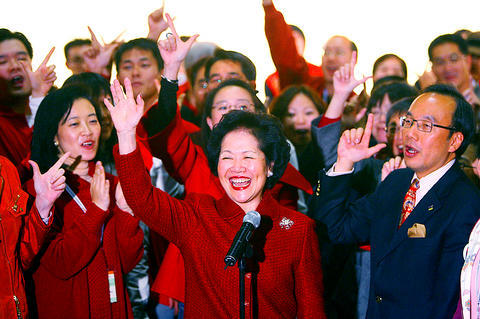Outspoken democrat Anson Chan (
But analysts warned that while Chan -- a former No. 2 in the government during both British and Chinese rule -- was an expert in administration, she would need to hone her political skills to gain allies and influence Beijing.
Chan, 67, dubbed "Hong Kong's conscience" for championing civil liberties, swept past her closest rival, former security chief Regina Ip (

PHOTO: AFP
Ip, who was backed by Beijing-allied parties but remembered for attempting to push through a deeply unpopular anti-subversion bill, shocked many by taking 43 percent of the votes.
The race was one of the most closely watched and fiercely battled elections since the territory was returned to China a decade ago, as both camps tried to turn it into a referendum on the pace of democratic reform.
"The result of this election indicates that Hong Kong people are anxious to put forward democracy. We think we're all ready to implement universal suffrage in 2012," the date of the next election for the territory's leader, Chan said in her victory speech early yesterday, before popping the cork on a bottle of champagne.
Analysts said that the win was a much-needed fillip for the pro-democracy camp who lost heavily in last month's district elections to the Beijing-friendly conservatives. But some warned Chan against taking too hard a line against Beijing in her push to hold the central government accountable.
"Right now, Beijing views Anson Chan with suspicion. It doesn't know her political motives," said James Sung (宋立功), a political academic at City University.
"When she was not in government, she could criticize Beijing's role in Hong Kong affairs as it didn't matter ... But now she's moved one step forward into government, into the political area, and that's what worries them," he said.
"Her first task will be gaining Beijing's trust and to do that she needs to tone down the fighting spirit that got her elected," he said.
Beijing has not commented on Chan's victory.
Chan was the first woman and the first ethnic Chinese to rise to chief secretary for administration, the No. 2 government post, under British rule. She continued in the post when the territory was handed back to China in 1997, but stepped down in 2001.
Chan's victory did allay some fears that political reform had fallen off the agenda amid an economic upswing in the territory.
"I think it shows that a lot of middle class people in Hong Kong still care about democracy, even though the economy is getting better, the stock market is rising, and the economy is more dependent on China," said Ma Ngok (
"This is something that Beijing needs to think about," Ma said.

WAITING GAME: The US has so far only offered a ‘best rate tariff,’ which officials assume is about 15 percent, the same as Japan, a person familiar with the matter said Taiwan and the US have completed “technical consultations” regarding tariffs and a finalized rate is expected to be released soon, Executive Yuan spokeswoman Michelle Lee (李慧芝) told a news conference yesterday, as a 90-day pause on US President Donald Trump’s “reciprocal” tariffs is set to expire today. The two countries have reached a “certain degree of consensus” on issues such as tariffs, nontariff trade barriers, trade facilitation, supply chain resilience and economic security, Lee said. They also discussed opportunities for cooperation, investment and procurement, she said. A joint statement is still being negotiated and would be released once the US government has made

NEW GEAR: On top of the new Tien Kung IV air defense missiles, the military is expected to place orders for a new combat vehicle next year for delivery in 2028 Mass production of Tien Kung IV (Sky Bow IV) missiles is expected to start next year, with plans to order 122 pods, the Ministry of National Defense’s (MND) latest list of regulated military material showed. The document said that the armed forces would obtain 46 pods of the air defense missiles next year and 76 pods the year after that. The Tien Kung IV is designed to intercept cruise missiles and ballistic missiles to an altitude of 70km, compared with the 60km maximum altitude achieved by the Missile Segment Enhancement variant of PAC-3 systems. A defense source said yesterday that the number of

Taiwanese exports to the US are to be subject to a 20 percent tariff starting on Thursday next week, according to an executive order signed by US President Donald Trump yesterday. The 20 percent levy was the same as the tariffs imposed on Vietnam, Sri Lanka and Bangladesh by Trump. It was higher than the tariffs imposed on Japan, South Korea and the EU (15 percent), as well as those on the Philippines (19 percent). A Taiwan official with knowledge of the matter said it is a "phased" tariff rate, and negotiations would continue. "Once negotiations conclude, Taiwan will obtain a better

FLOOD RECOVERY: “Post-Typhoon Danas reconstruction special act” is expected to be approved on Thursday, the premier said, adding the flood control in affected areas would be prioritized About 200cm of rainfall fell in parts of southern Taiwan from Monday last week to 9am yesterday, the Central Weather Administration (CWA) said. Kaohsiung’s Taoyuan District (桃源) saw total rainfall of 2,205mm, while Pingtung County’s Sandimen Township (三地門) had 2,060.5mm and Tainan’s Nanhua District (南化) 1,833mm, according to CWA data. Meanwhile, Alishan (阿里山) in Chiayi County saw 1,688mm of accumulated rain and Yunlin County’s Caoling (草嶺) had 1,025mm. The Pingtung County Government said that 831 local residents have been pre-emptively evacuated from mountainous areas. A total of 576 are staying with relatives in low-lying areas, while the other 255 are in shelters. CWA forecaster